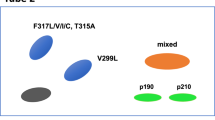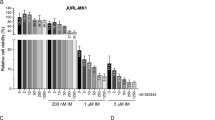Abstract
Mutations of the BCR-ABL1 kinase domain seem to be the most common cause of imatinib mesylate resistance in chronic myeloid leukemia (CML). We screened BCR-ABL1 kinase domain mutations using nested reverse transcriptase polymerase chain reaction and direct sequencing in 30 CML patients including 22 resistant patients and 8 patients with optimal response to imatinib. Three mutations of two different types were identified in 3 of 22 (13.6%) resistant patients. Two patients had p.E355G mutation in the catalytic domain, and the third patient had p.G398R in the activation loop that is reported here for the first time. No mutation was found in patients with optimal response to imatinib. The frequency of mutations was similar in patients with primary resistance compared with patients with secondary resistance (25 vs 11%; P=1). Mutation status had no impact on the overall survival and progression-free survival. p.E355G mutation was correlated with shorter survival (P=0.047) in resistant patients. We conclude that BCR- ABL1 mutations are associated with the clinical resistance, but may not be considered the only cause of resistance to imatinib. Mutational analysis may identify resistant patients at risk of disease progression.
Similar content being viewed by others
Log in or create a free account to read this content
Gain free access to this article, as well as selected content from this journal and more on nature.com
or
References
Calabretta, B. & Perrotti, D. The biology of CML blast crisis. Blood 103, 4010–4022 (2004).
Kantarjian, H., Sawyers, C., Hochhaus, A., Guilhot, F., Schiffer, C., Gambacorti-Passerini, C. et al. Hematologic and cytogenetic responses to imatinib mesylate in chronic myelogenous leukemia. New Engl. J. Med 346, 645–652 (2002).
Ramirez, P. & DiPersio, J. F. Therapy options in imatinib failures. Oncologist 13, 424–434 (2008).
Wongboonma, W., Thongnoppakhun, W. & Auewarakul, C. U. A single-tube allele specific-polymerase chain reaction to detect T315I resistant mutation in chronic myeloid leukemia patients. J. Hematol. Oncol. 4, 1756–1763 (2011).
Iqbal, Z., Aleem, A., Iqbal, M., Naqvi, M. I., Gill, A., Taj, A. S. et al. Sensitive detection of pre-existing BCR-ABL kinase domain mutations in CD34+ cells of newly diagnosed chronic-phase chronic myeloid leukemia patients is associated with imatinib resistance: implications in the post-imatinib era. PLoS ONE 8, e55717 (2013).
Mathisen, M. S., Kantarjian, H. M., Cortes, J. & Jabbour, E. Mutant BCR-ABL clones in chronic myeloid leukemia. Haematologica 96, 347–349 (2011).
Kim, S. H., Kim, D., Kim, D. W., Goh, H. G., Jang, S. E., Lee, J. et al. Analysis of Bcr‐Abl kinase domain mutations in Korean chronic myeloid leukaemia patients: poor clinical outcome of P‐loop and T315I mutation is disease phase dependent. Hematol. Oncol. 27, 190–197 (2009).
Jabbour, E., Kantarjian, H., Jones, D., Talpaz, M., Bekele, N., O'Brien, S. et al. Frequency and clinical significance of BCR-ABL mutations in patients with chronic myeloid leukemia treated with imatinib mesylate. Leukemia 20, 1767–1773 (2006).
Wei, Y., Hardling, M., Olsson, B., Hezaveh, R., Ricksten, A., Stockelberg, D. et al. Not all imatinib resistance in CML are BCR-ABL kinase domain mutations. Ann. Hematol. 85, 841–847 (2006).
Baccarani, M., Saglio, G., Goldman, J., Hochhaus, A., Simonsson, B., Appelbaum, F. et al. Evolving concepts in the management of chronic myeloid leukemia: recommendations from an expert panel on behalf of the European LeukemiaNet. Blood 108, 1809–1820 (2006).
Soverini, S., Hochhaus, A., Nicolini, F. E., Gruber, F., Lange, T., Saglio, G. et al. BCR-ABL kinase domain mutation analysis in chronic myeloid leukemia patients treated with tyrosine kinase inhibitors: recommendations from an expert panel on behalf of European LeukemiaNet. Blood 118, 1208–1215 (2011).
Wongboonma, W., Thongnoppakhun, W. & Auewarakul, C. U. BCR-ABL kinase domain mutations in tyrosine kinase inhibitors-naïve and-exposed Southeast Asian chronic myeloid leukemia patients. Exp. Mol. Pathol. 92, 259–265 (2012).
Koptyra, M., Falinski, R., Nowicki, M. O., Stoklosa, T., Majsterek, I., Nieborowska-Skorska, M. et al. BCR/ABL kinase induces self-mutagenesis via reactive oxygen species to encode imatinib resistance. Blood 108, 319–327 (2006).
Press, R. D., Love, Z., Tronnes, A. A., Yang, R., Tran, T., Mongoue-Tchokote, S. et al. BCR-ABL mRNA levels at and after the time of a complete cytogenetic response (CCR) predict the duration of CCR in imatinib mesylate–treated patients with CML. Blood 107, 4250–4256 (2006).
Jones, D., Kamel-Reid, S., Bahler, D., Dong, H., Elenitoba-Johnson, K., Press, R. et al. Laboratory practice guidelines for detecting and reporting BCR-ABL drug resistance mutations in chronic myelogenous leukemia and acute lymphoblastic leukemia: a report of the Association for Molecular Pathology. J. Mol. Diagn 11, 4–11 (2009).
Qin, Y., Chen, S., Jiang, B., Jiang, Q., Jiang, H., Li, J. et al. Characteristics of BCR–ABL kinase domain point mutations in Chinese imatinib-resistant chronic myeloid leukemia patients. Ann. Hematol. 90, 47–52 (2011).
Soverini, S., Colarossi, S., Gnani, A., Rosti, G., Castagnetti., F., Poerio., A. et al. Contribution of ABL kinase domain mutations to imatinib resistance in different subsets of Philadelphia-positive patients: by the GIMEMA Working Party on Chronic Myeloid Leukemia. Clin. Cancer Res. 12, 7374–7379 (2006).
Awidi, A., Ababneh, N., Magablah, A., Bsoul, N., Mefleh, R., Marei, L. et al. ABL kinase domain mutations in patients with chronic myeloid leukemia in Jordan. Genet. Test. Mol. Biomarkers 16, 1317–1321 (2012).
Khorashad, J. S., de Lavallade, H., Apperley, J. F., Milojkovic, D., Reid, A. G., Bua, M. et al. Finding of kinase domain mutations in patients with chronic phase chronic myeloid leukemia responding to imatinib may identify those at high risk of disease progression. J. Clin. Oncol. 26, 4806–4813 (2008).
Hochhaus, A., Kreil, S., Corbin, A., La Rosee, P., Müller, M., Lahaye, T. et al. Molecular and chromosomal mechanisms of resistance to imatinib (STI571) therapy. Leukemia 16, 2190–2196 (2002).
Azam, M., Latek, R. R. & Daley, G. Q. Mechanisms of autoinhibition and STI-571/imatinib resistance revealed by mutagenesis of BCR-ABL. Cell 112, 831–843 (2003).
Redaelli, S., Piazza, R., Rostagno, R., Magistroni, V., Perini, P., Marega, M. et al. Activity of bosutinib, dasatinib, and nilotinib against 18 imatinib-resistant BCR/ABL mutants. J. Clin. Oncol. 27, 469–471 (2009).
Laneuville, P., DiLea, C., Yin, O. Q., Woodman, R. C., Mestan, J. & Manley, P. W. Comparative In vitro cellular data alone are insufficient to predict clinical responses and guide the choice of BCR-ABL inhibitor for treating imatinib-resistant chronic myeloid leukemia. J. Clin. Oncol. 28, e169–e171 (2010).
Sharma, P., Mohanty, S., Kochupillai, V. & Kumar, L. Mutations in ABL kinase domain are associated with inferior progression-free survival. Leuk. Lymphoma 51, 1072–1078 (2010).
Acknowledgements
We are grateful for the help and collaboration of Dr Soroush Sardari (Department of Biotechnology, Biotechnology Research Center, Pasteur Institute of Iran) for the revision of the manuscript and Amirhossein Karami (Amirkabir university,Tehran, Iran) for association in statistical analysis. This study was supported by grant number 546 from the Pasteur Institute of Iran.
Author information
Authors and Affiliations
Corresponding author
Ethics declarations
Competing interests
The authors declare no conflict of interest.
Rights and permissions
About this article
Cite this article
Rostami, G., Hamid, M., Yaran, M. et al. Incidence and clinical importance of BCR-ABL1 mutations in Iranian patients with chronic myeloid leukemia on imatinib. J Hum Genet 60, 253–258 (2015). https://doi.org/10.1038/jhg.2015.11
Received:
Revised:
Accepted:
Published:
Issue date:
DOI: https://doi.org/10.1038/jhg.2015.11
This article is cited by
-
Imatinib and Patient-Related Outcomes in Chronic Myeloid Leukemia: A Single Centric Experience
SN Comprehensive Clinical Medicine (2022)



